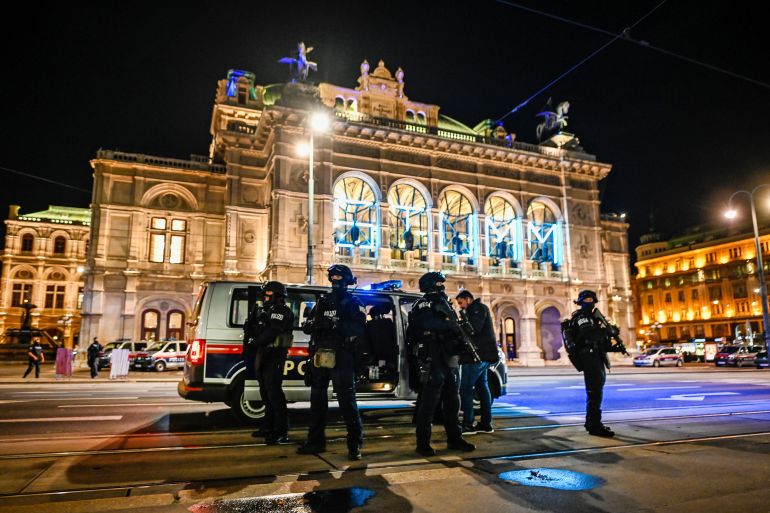Questions mount over Vienna gunman, a convicted ISIL sympathiser
Austrian Macedonian national Kujtim Fejzulai, who killed four people, was released on probation in December.

Questions were mounting in Austria on Wednesday about how a convicted ISIL (ISIS) sympathiser was able to carry out the deadly gun rampage in the heart of the capital Vienna.
Investigators are trying to piece together more information about the gunman’s circle after detaining 14 people in the wake of Monday’s shooting, the first major attack in Austria for decades.
Keep reading
list of 2 itemsTurkey praises ‘two heroes’ who helped victims in Vienna attack
The assailant, named as 20-year-old dual Austrian Macedonian national Kujtim Fejzulai, had been convicted and sentenced to prison in April last year for trying to travel to Syria to join ISIL.
But he was released on probation in December, before the end of his 22-month sentence, and had been referred to organisations specialising in “de-radicalisation”.
ISIL, which has claimed numerous attacks in Europe, said on Tuesday a “soldier of the caliphate” was responsible for the shooting, which killed four people and left more wounded.
The gunman opened fire indiscriminately in the historic centre of the city just hours before Austria imposed a coronavirus lockdown when people were out in bars and restaurants enjoying a final night of relative freedom.
The streets of Vienna were returning to normal on Wednesday – albeit under the virus restrictions – after schools and shops had largely stayed closed after the attack.
Austrian Chancellor Sebastian Kurz has described the decision to release Fejzulai – who was shot dead by police on Monday evening – as “definitely wrong”.
“If he had not been released then the terror attack would not have been possible,” Kurz told public broadcaster ORF on Tuesday.
Austria’s top security chief Franz Ruf told local media that at his last session of a publicly-funded de-radicalisation programme in late October, Fejzulai had condemned the recent attacks in France.
Interior Minister Karl Nehammer said on Tuesday the attacker had successfully “fooled” the programmes in order to achieve his early release.
Nehammer said his case had shown up a “fracture” in the system and that raids at Fejzulai’s home after the attack revealed plentiful evidence of his radical views.
He referred to a Facebook post in which Fejzulai posed with the Kalashnikov and the machete he would go on to use in the attack, together with ISIL slogans.
“Nobody would have thought him capable of something like this,” Nikolaus Rast, the lawyer who represented Fejzulai last year, told AFP on Wednesday.
He also raised questions about possible oversights by the de-radicalisation programmes Fejzulai had attended.
“Without wanting to put the blame on someone, if they are the experts, why didn’t they notice anything?” Rast said.
“They must have had the most – and the last – contact with him.”
Police are now working on the assumption that Fejzulai was the sole gunman after the authorities initially feared in the aftermath of the attack that more than one assailant could be at large.
They have carried out 18 raids and made 14 arrests over the killings, and Ruf said it was possible some of those currently being questioned by police could be accomplices.
The investigation is spanning several countries, with Switzerland making two arrests and Macedonia, where Fejzulai has family roots, cooperating with the Austrian authorities.
Kurz on Tuesday called for an EU response to “political Islam”, saying the ideology was “dangerous” for European freedoms and values.
His office said on Wednesday he had been in touch with French President Emmanuel Macron to discuss joint initiatives in the fight against “terrorism”.
The recent republication of cartoons of the Prophet Muhammad in France has caused new tensions worldwide, sparking protests in some Muslim-majority countries.
France itself has seen a deadly assault on churchgoers in the Mediterranean city of Nice and the beheading of a teacher near Paris.